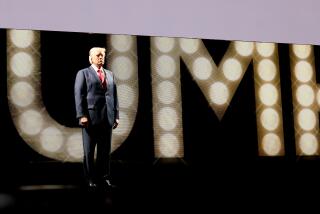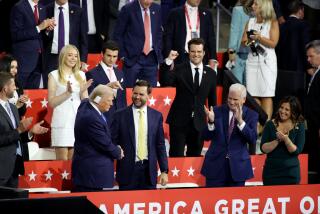At GOP gathering, divergent directions
- Share via
OXON HILL, Md. — To most of those attending this year’s biggest gathering of conservative activists, the messenger — not the message — was to blame for the Republican Party’s defeat in the 2012 presidential election.
That made Mitt Romney’s appearance at the Conservative Political Action Conference on Friday potentially awkward. But the crowd responded enthusiastically to his first public speech since election night.
“As someone who just lost the last election, I’m probably not in the best position to chart the course for the next one,” remarked Romney, who also said that “It’s up to us to make sure that we learn from our mistakes and my mistakes.”
As Romney’s remarks indicated, what some are calling the Republican Party’s identity crisis was prominently on display at the suburban Maryland convention center where the annual conservative gathering took place. Leading party figures, including many who are considered future stars, felt compelled to address the way forward for a party that has lost the popular vote in five of the last six presidential elections.
The highest-ranking Republican official to appear, Senate Minority Leader Mitch McConnell of Kentucky, professed to be “a little tired of the hand-wringing.” He joked that the proliferation of conferences and lunch panels about last fall’s election defeat made him “wonder if the caterers’ union is behind it.”
But the crowds here responded most enthusiastically to unapologetic remarks from the stage, underscoring the resistance that any GOP repair effort is likely to face. The conservative base strongly opposes any move toward the center ideologically to broaden the party’s appeal, particularly to minority voters.
That was evident from the guest list: uninvited were New Jersey Gov. Chris Christie, one of the nation’s most popular Republicans, and Virginia Gov. Bob McDonnell. Conference organizers said they regarded Christie, a top GOP presidential prospect in 2016, as insufficiently opposed to more government spending; McDonnell, another presidential possibility, recently signed into law a tax increase to pay for transportation improvements.
A former governor who did appear, Jeb Bush of Florida, delivered a blunt appraisal of his party to a banquet audience on Friday night.
“Never again can the Republican Party simply write off entire segments of our society because we assume our principles have limited appeal. They have broad appeal,” he said, a remark that some interpreted as a swipe at Romney’s campaign assertion that nearly half the electorate would never vote for him.
“Way too many people believe Republicans are anti-immigrant, anti-woman, anti-science, anti-gay, anti-worker, and the list goes on and on and on,” said Bush, who recently opened the door to a 2016 run. “We need to be the party of inclusion and acceptance.”
Rick Santorum, a past and possibly future presidential candidate, earlier warned that it would be a mistake for Republicans merely to search for more efficient ways to deliver government benefits. “Face it, the left can always promise more stuff, and make it sound like they care more, because they make it easier for Americans by providing the stuff for them, through government programs, paid for by somebody else’s money,” the former senator from Pennsylvania said.
Louisiana Gov. Bobby Jindal, another likely 2016 contender, echoed that advice. “We’ve got to recalibrate the compass of conservatism” by looking outside Washington to the states and the private sector, he said.
Others blamed the news media for exaggerating the party’s problems. Texas Gov. Rick Perry pointed a finger at Romney, who defeated him in the 2012 primaries.
“The popular media narrative is that this country has shifted away from conservative ideals, as evidenced by the last two presidential elections,” said Perry, who may try again in 2016. “That might be true if Republicans had actually nominated conservative candidates in 2008 and 2012.”
Sen. Marco Rubio of Florida, who is working on the party’s most glaring challenge — a demographic gap with Democrats among Latino voters — seemed to play down the need for change in addressing GOP activists, many of whom reject a path to citizenship for undocumented immigrants.
“We don’t need a new idea. There is an idea. The idea is called America, and it still works,” said Rubio, who entirely avoided the topic of immigration in an otherwise wide-ranging speech.
The libertarian leanings of much of the crowd were evident in the embrace offered Sen. Rand Paul of Kentucky, the party’s newest star and a particular favorite with young activists. Paul came in first in a Saturday straw poll of 2016 presidential preferences, narrowly ahead of Rubio.
Santorum was a distant third, and Christie was fourth. Nearly two dozen potential candidates were on the ballot; Bush, who asked that his name be taken off the ballot, was not among them.
Paul said the Republican Party “has to change by going forward to the classical and timeless ideas enshrined in our Constitution.”
The first-term senator recently gained favor with both conservatives and civil libertarians on the left by filibustering President Obama’s CIA nominee as a protest against the U.S. government’s policy on the use of unmanned drones.
To applause, Paul said the GOP “must stand for something so powerful and so popular that it brings together people from the left and the right and the middle. We need a Republican Party that shows up on the South Side of Chicago and shouts at the top of our lungs: ‘We are the party of jobs and opportunity. The GOP is the ticket to the middle class.’”
He also poked at his establishment critics, including Sen. John McCain, the 2008 presidential nominee, declaring to cheers that “the GOP of old has grown stale and moss-covered.”
The three-day gathering concluded just ahead of the release of a major post-election study by the Republican National Committee, which will be “big” and “bold,” national party Chairman Reince Priebus promised on Saturday. The report, to be made public Monday, is expected to call for, among other things, a major technological upgrade of the party’s digital operation to counter a superior Democratic outreach machine.
But exactly what message an improved machine would deliver to voters remained up in the air. That was evident by what Romney, the party’s most recent leader, did and did not say.
Like some other speakers at the conference, Romney advised Republicans to put a powerful U.S. military at the top of their agenda.
“Do whatever you can to keep America strong, to keep America prosperous and free and the most powerful nation on Earth,” Romney said.
Yet although he singled out his former running mate, Rep. Paul Ryan (R-Wis.), for praise, Romney did not address the spending plan that the House Budget Committee chairman just released. . It would devote $2 trillion less for defense over the next 10 years than Romney and Ryan had proposed in last fall’s campaign.
More to Read
Sign up for Essential California
The most important California stories and recommendations in your inbox every morning.
You may occasionally receive promotional content from the Los Angeles Times.










